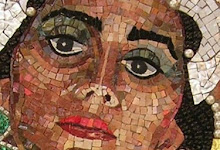
It’s been 3 days since our little fender bender (which, by the way, may have totaled our car) and I’m still thinking about it. Actually, to be more precise – it’s not the crash that has me thinking, it’s the fear that I experienced in the moments before it when we caught our first glance of the Arab posse walking towards us. We were panicked and scared and truly feared for our lives. The debate that I am having over and over again in my mind is about how I could have, or should have, reacted in those moments. No question, I should have kept calm – truthfully, my panicked state of mind began the moment my foot hit the gas pedal when leaving the Eitam. I could have kept my cool from the get-go and had a much more enjoyable ride – at least until the point of collision. But should I have trusted that nothing bad would befall us? Is fearing the worst a lack of emunah, faith? Others in the car with me have since suggested that the incident was meant to literally jolt us from our seats in order to wake us up to the amazing individual providence that Hashem provides us with ‘b’chol eit u’bchol sha’ah’ – at every moment, in every hour. Indeed it was a nes, a miracle, that no one was hurt. I wish the lesson were as simple for me. Here is my dilemma: I have Emunah that everything that Hashem does is for the best – for our greatest good. No questions asked. However, what if the greatest good doesn’t always feel like the greatest good? The best thing for us can, and sometimes does, feel downright petrifying and painful. I see the faces and names of terrorist victims and holocaust victims – holy and pure – and yet their greatest good was an end that I dare not utter. I don’t need to understand Hashem’s ways and I trust that in the next world all makes sense and these holy ones are at peace. Yet their stories create quite a conundrum for me. I can trust that Hashem will help me. I can know that all is for the best. Yet, how does that help me keep calm and feeling safe when faced with a true danger that, for all I know, can be for my greatest good? In other words, how could I have known that being attacked by a group of Arabs was not in our best interest on that day? “Though I walk through the valley of the shadow of death, I do not fear because you are with me…(Psalms) Does the author of Tehillim not fear because he has faith that he will be saved from death, or because he is not afraid to die? Are we too expected to laugh in the face of death? That’s a tall order. And there is no better place to practice then in this beautiful rose of a land that is surrounded by plenty of thorns.

No comments:
Post a Comment